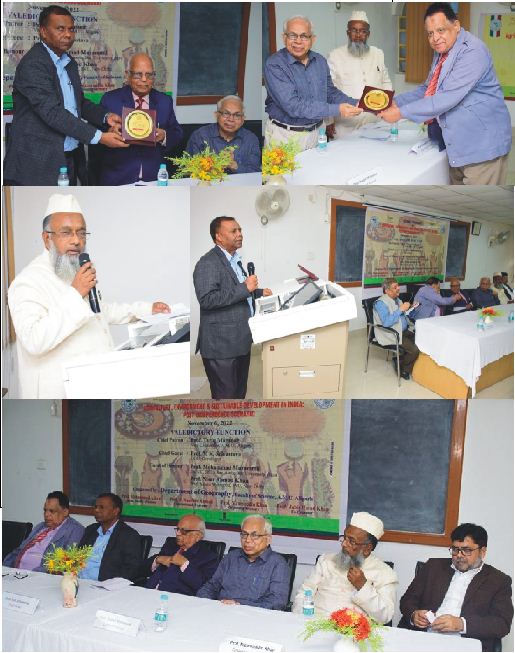
Aligarh : The contribution of agriculture to the Indian economy has been enormous, although there is an urgent need to extensively adopt organic farming and focus on sustainable development for safeguarding the environment and natural ecosystem.
This was highlighted by experts in the two-day national conference on ‘Agriculture, Environment and Sustainable Development in India: Post Independence Scenario’ organized by the Department of Geography, Aligarh Muslim University (AMU), in collaboration with ICSSR and DST Department of Earth Sciences, Government of India.
Addressing the valedictory function as the chief guest Prof V. K. Srivastava, (former head of the department, DDU University, Gorakhpur) said “traditional agriculture was an important practice in the agency areas, especially among tribal communities, both from socioeconomic and ecological points of view. Mixed cropping, crop rotation, and mulching were some of the scientific practices in traditional agriculture”.
He pointed out that destruction of forests due to commercial over-exploitation over the last 3 to 4 decades has decreased the productivity of the soil. It has led to extensive soil erosion and reduced the land’s capacity to rejuvenate, affecting natural vegetation and water resources.
“Diversification of crops (including livestock), management of the soil to enhance and protect soil quality and consideration of farmers’ goals and lifestyle choices are some of the focal points to be considered for the well being of communities as well as the ecosystem and environment” Prof Srivastava added.
Guest of honour Prof Aslam Mahabood (Center of Regional Development, JNU) said women play a significant role in Agriculture, Environment, and Sustainable Development.
“Sustainable development depends on an equitable distribution of resources for today and the future. It cannot be achieved without gender equality. Many women groups are concerned that current economic development and globalization patterns are increasing the gap between rich and poor, benefiting men more than women, and leading to increased environmental degradation”, emphasized Prof Mahabood.
Earlier in the day, welcoming the guests and participants of the conference Prof Naushad Ahmad, (Convener of the conference, and Chairperson, Department of Geography, AMU) said “good research should cater to societal needs, and new areas such as climate change and its influence on biota and in turn on “blue economy” must be explored. The ocean is a vast resource, and the opportunities must be utilized for societal benefits”.
Prof Nizamuddin Khan, Organizing Secretary presented a brief report of the two-day conference, and Prof Tarik Usmani proposed the votes of thanks.
Earlier, attending the inaugural function as the chief guest, eminent scientist Dr. YVN Krishna Murthy, senior Professor and Registrar, Indian Institute of Space Science and Technology, Department of Space, Government of India delineated the importance of Geo-spatial technology for sustainable agricultural development and maintenance of the earth’s ecological balance.
“Strengthening of India’s agricultural research and extension systems is one of the most critical needs for agricultural growth. These services have declined over time due to chronic underfunding of infrastructure and operations. Encouraging farmers to diversify to higher-value commodities will be a significant factor for higher agricultural growth, particularly in rain-fed areas where poverty is high” he said.
Prof Murthy urged to develop markets, and enhance agricultural credit, and public expenditures. “Extensive government involvement in Indian agrarian marketing has created restrictions in internal and external trade, resulting in cumbersome and high-cost marketing and transport options for agricultural commodities. Even so, private sector investment in marketing, value chains, and agro-processing is growing but much needs to be done. While some restrictions are being lifted, considerably more needs to be done to enable diversification and minimize consumer prices. Improving access to rural finance for farmers is another need, as it remains difficult for farmers to get credit” he added.
Prof Murthy also highlighted the problems of reduction in groundwater levels, and soil erosion in several parts of the country.
“The watershed management programme, allied with initiatives from agricultural research and extension, may be the most suited agricultural program for promoting new varieties of crops and improved farm practices”, he pointed out.
Professor Noor Mohammad, (Department of Geography, Delhi School of Economics) highlighted the contribution of agriculture to the Indian economy and the problems and challenges that hamper agriculture growth.
“Per capita income of farmers is declining in trends, and ecological balance is under threat. In this scenario organic farming has to be increased, farmers should get more subsidies and loans and emphasis should be on rain fed crops” he said.
Prof. Mohammad Ashraf, Dean, Faculty of Science, AMU, said we must work with a trans-disciplinary approach to solve the emerging problems of agriculture, environment, and sustainable development.
Prof Naushad Ahmad, Chairperson, Department of Geography said the conference seeks to provide a platform for the scientific community, academicians, researchers, and young scientists to share their innovative ideas for sustainable development, environmental protection, ecological balance, and appropriate poverty and hunger mitigation strategies in India.
Prof. Nizamuddin Khan proposed the vote of thanks, while Prof Ateeq Ahmad conducted the proceedings.
More than 160 participants from India and abroad attended the two-day conference which had twelve technical sessions, poster, and oral presentations by the delegates and the students.


